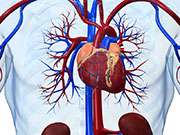Metabolic syndrome may raise death risk postangiography

(HealthDay)—For postangiography patients, metabolic syndrome is associated with increased mortality, especially in patients with stable angina, according to a study published in the Feb. 1 issue of The American Journal of Cardiology.
Yaron Arbel, M.D., from Tel Aviv University in Israel, and colleagues examined the link between metabolic syndrome and risk for long-term mortality in a cohort of 3,525 patients undergoing coronary angiography for various clinical indications.
The researchers found that 30 percent of the cohort had metabolic syndrome, and these patients were more likely to have advanced coronary artery disease and acute coronary syndrome. Regardless of clinical presentation, patients with metabolic syndrome had more abnormalities in their metabolic and inflammatory biomarkers. During a mean follow-up period of 1,614 ± 709 days, there were 495 deaths. In the general cohort, metabolic syndrome correlated with an increased risk of death (hazard ratio, 1.27; 95 percent confidence interval [CI], 1.01 to 1.56). In stable patients, metabolic syndrome had a significant impact on mortality (hazard ratio, 1.55; 95 percent CI, 1.1 to 2.18), while there was no significant effect on mortality for patients with acute coronary syndrome (hazard ratio, 1.11; 95 percent CI, 0.86 to 1.44).
"In conclusion, metabolic syndrome is associated with increased mortality in postangiography patients," the authors write. "Its adverse outcome is mainly seen in patients with stable angina."
More information:
Abstract
Full Text (subscription or payment may be required)
Copyright © 2015 HealthDay. All rights reserved.





















